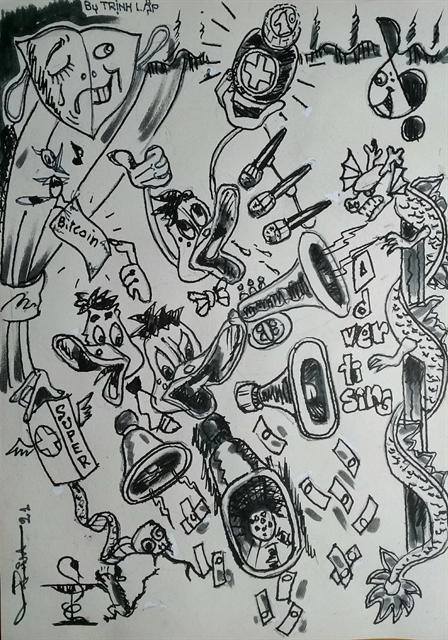 Talk Around Town
Talk Around Town


|
| Illustration by Trịnh Lập |
By Lương Thu Hương
More and more Vietnamese artists have publicly advertised a product or a brand on social networks, which has provided them with significant additional income but could also damage their popularity.
A recent VTV report caused a stir among netizens when they uncovered that a renowned actress had advertised a medical product using a fake check-up.
In a live-streamed video on her personal page of more than 900,000 followers, the actress filmed herself in a car and told viewers she was about to have a routine health check.
To increase the viewers’ trust, the actress turned the camera to show the Hà Nội Obstetrics and Gynecology Hospital and prove she was actually going for a health check.
She also held out a piece of paper that was supposed to be her medical check-up. The paper stated she had a small tumour in her uterus, however, after using a product “with the capacity of dissolving fibroids and cysts”, “the size of the tumour has magically reduced”, said the actress on the stream.
Later, a representative of the hospital confirmed to VTV that the medical check-up she was holding was fake as the hospital has neither a room nor a doctor named similar to those on it.
The actress, who is familiar to Vietnamese audiences for her role in the popular comedy Gặp Nhau Cuối Năm (Year-End Meet) which airs on VTV on Lunar New Year's Eve, has not made any public statement on the incident and is at the centre of much public criticism.
More and more artists are promoting a wide range of products, from cancer drugs, cosmetics and food to household appliances, on their social networks.
The remuneration from such advertisements is a significant source of income for celebrities.
One fashion model in Hà Nội revealed that she could earn from VNĐ30 to 50 million (US$1,300-2,200) for every live stream advertising cosmetics on her Facebook page.
For those with many fans and followers on social networks, they can receive up to VNĐ100-120 million ($4,300-5,200), she added.
However, the artists can become the victims of the advertisements, have their reputations dampened and even face boycotts from their own fans if they just prioritise money and fail to study the product thoroughly.
For example, Việt Nam’s Miss Universe Phạm Hương was once condemned for advertising and reviewing a cream that was not recommended by the Ministry of Health. Meanwhile, other renowned artists like Bảo Thanh, Diễm My or Bảo Thy faced public outrage when they introduced a white bath cream product that was confiscated by authorities due to its poor quality.
Many viewers and consumers tend to trust what they have seen in ads that feature their favourite celebrities with the belief that celebrities don’t use fake goods.
Consequently, they are tempted to purchase products that may not be truly effective or even harm their health. In other words, they become the direct victims of irresponsible ads.
In response to artists advertising products on social networks and YouTube, the Director of the Department of Grassroots Culture, under the Ministry of Culture, Sports and Tourism, Ninh Thị Thu Hương, has sent an official dispatch to VTV, radio stations and other cultural institutes across the country, requesting the strict management of the issue.
The dispatch mentioned that a number of ads for functional and medicinal foods have exaggerated their efficacy, affecting consumers' health, property and confidence.
The Department of Grassroots Culture stated that a number of ads for functional foods and health foods have been false and improperly used.
“To control and correct advertising activities, the Department of Grassroots Culture requests agencies and units to strictly control advertising content for functional foods, health-related foods and similar products on the mass media, ensuring that the content must be trustworthy, clear, and not cause damage to the producers, traders and recipients of ads as prescribed in the Law on Advertising," the director stated.
However, similar advertising on foreign social platforms can hardly be controlled and those who advertise have to be responsible personally.
Amid the viewers’ criticism, some artists have chosen to publicly apologise.
Comedian Nam Thư posted an apology admitting that she was wrong to promote cryptocurrency that has yet to be legally traded in Việt Nam.
Actor Quyền Linh also sent an apology for advertising a functional health food to help reduce stomach ulcers the effectiveness of which is said to be exaggerated.
On the other hand, many artists remain silent and just delete the controversial ads, while some of them have learned to become more cautious about accepting an invitation to promote a product.
Singer Thanh Thảo, for example, claimed to have refused to advertise for many brands if she finds them untrustworthy. She even allegedly turned down a contract when the ad was about to be filmed when she discovered the brand had been accused of deceiving consumers before.
According to Trịnh Kim Chi, vice president of the HCM City Theatre Association, it is alarming that many artists have advertised products with false information on their social networks.
“Members of the association have frequently been reminded to carefully examine the related documents and the origin of the products that they advertise, particularly medicinal ones.
“The artists should ask the producers to present evidence proving that the product is healthful and they should verify the effectiveness of the products themselves before introducing it to the audience," Chi said. VNS